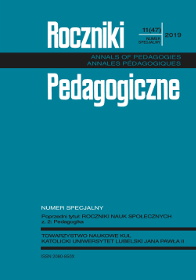Możliwości pracy z osobami wykluczonymi społecznie w inkluzyjno-katalaktycznym modelu w procesie reintegracji społecznej
Possibilities for people with social disabilities
Author(s): Anna KieszkowskaSubject(s): Social Sciences, Education, Sociology, Criminology, Inclusive Education / Inclusion
Published by: Towarzystwo Naukowe KUL & Katolicki Uniwersytet Lubelski Jana Pawła II
Keywords: equal opportunities; social exchange – catalysis; social reintegration; social inclusion; the concept of social reorganization
Summary/Abstract: Entering re-adaptation programs until recently aroused some concerns and lack of skills of their implementation, which after some time, at least in the belief that prison staff raises greater understanding and motivation to implement. It is likely that in the near future, those who are excluded, and returning to society, they can have a sense of freedom, the responsibility for their actions. Prevention programs, readaptation, reintegration or improving the functioning of the social system for a specific group or social environment should Reaching-you generously from the lowest level, or individuals involved in social issues and society to change their way of thinking and evaluating, mutual functioning and participation in a given system. The transformation of modes of action of individuals or groups may result from the transformation of the inner or outer mean to adapt to changing conditions without affecting significantly the current shape of the internal structure of the entity. Both options, ie. Change in behavior resulting from changes in the values and beliefs and the instrumental behavior change while maintaining the existing values and provi-Konan nominate two ends of a continuum of social adaptation, including social reintegration as a readjustment in the entity being in isolation to fully autonomous, active and valuable life according to the terms and conditions of socio-moral prevailing in the local environment. Reintegration activities, including self-help, they have to build and maintain skills for participation in the local community and the adoption of new acceptable social roles in the workplace, residence or domicile in an exchange of tangible and intangible. Exchange-based social responsibility for another human being, trust, the right to choose and commit represents an opportunity for socially excluded people in finding their own resources and potentials within the open environmental conditions. In thought catalaxy being a member of society means not only economic exchange through the production of certain goods, but also accepting the community as a full citizen and make important and responsible tasks in the community.
Journal: Roczniki Pedagogiczne
- Issue Year: 11/2019
- Issue No: S
- Page Range: 229-256
- Page Count: 28
- Language: Polish

